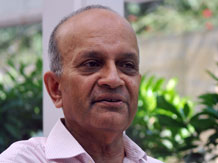 Former Axis Bank chairman and Morgan Stanley India chief, P J Nayak, who headed the Reserve Bank of India (RBI) —appointed committee on governance requirement at banks, says one of the focus areas of his report is providing a level playing field to public-sector banks (PSBs), which are facing deep stress.
Former Axis Bank chairman and Morgan Stanley India chief, P J Nayak, who headed the Reserve Bank of India (RBI) —appointed committee on governance requirement at banks, says one of the focus areas of his report is providing a level playing field to public-sector banks (PSBs), which are facing deep stress.
In a wide-ranging interaction with Business Standard — his first after giving the report that RBI made public on Wednesday — Nayak said, contrary to some misleading reports, the committee did not make any case for privatisation of PSBs. Rather, it focused on an urgent need to remove discriminatory external shackles, so that these banks could compete fairly with private peers. The shackles included the government’s failure in distancing itself from several governance functions and dual regulation by the RBI and the government.
For example, Nayak said, there were almost no independent directors on the boards of government banks, despite the Securities and Exchange Board of India (Sebi) regulation for listed companies mandating that 50 per cent of directors must be independent. “This is wholesale violation of Sebi’s listing requirements. We have to bring everything under the Companies Act.”
Nayak said the Bank Nationalisation Act talked about eight different categories of boards of directors. Similarly, the SBI Act had seven different categories of directors. This, he said, was like splitting the board into tiny components and finding people for each component. The companies law, on the other hand, has three categories of directors — full-time directors, part-time directors and part-time non-independent directors.
Talking about the need to move to a uniform licence regime across banks, irrespective of ownership, Nayak said the report talked about many banks that defied ownership logic. Bank of Nainital, despite Bank of Baroda having a 99 per cent ownership stake in it, is classified as an old private-sector bank. ING Vysya Bank, in which ING (42 per cent stake) is the only foreign shareholder, is also an old private-sector bank. “There clearly are historical reasons for these specific forms of licensing but they appear illogical from an ownership standpoint.”
On the proposed Bank Investment Company (BIC), Nayak said it was like a passive alternative investment fund. All the government functions will have to be transferred to the BIC, whose only accountability would be to give adequate returns to the government on its investment in banks. “It should act like a private equity fund which manages the asset and ensures returns to investors,” Nayak said, adding the chief executive of BIC should be a professional banker or someone who has worked in the private equity sector. The return he delivers on the capital he manages is a major parameter by which his performance will be analysed.
“The choice for the government is obvious. I am sure it wants the banks it owns to be well governed, by giving it to a professional intermediate investment company,” he said.
Nayak said the committee identified many other areas where government banks did not have a level playing field. On the contentious proposal to reduce the government’s stake to below 50 per cent, he said it would actually be a good bargain for the government, which would still remain the owner of these banks.
For example, even with a 45 per cent stake, the government can exercise complete dominance at shareholder meetings. “All we are saying is that the government disadvantages the very banks in which it has invested in. What could be more ironical,” he asked.
Nayak said the government's ability to provide capital to its banks would have an impact on fiscal consolidation. “We have made some projections on how much Tier-I capital government banks would need till 2018. The most prudent projection suggests they will need Rs 5.87-lakh-crore capital infusion till that year according to the Basel-III norms”.
Nayak also said he had no idea whether the government would agree with the contents of the report. "I can only hope the RBI can use this document in its dialogue with the finance ministry." Giving examples of how governments encroached on the RBI's turf, Nayak said the instruction on uniform card rates for deposits were against the interest of depositors and also against the RBI policy of deregulated interest rates. If telecom or FMCG companies could compete on prices, there was no reason why banks could not compete as well, he said.
The first step, he said, was to empower public-sector banks' boards, which should choose the CEO. For example, DBS is the foremost bank in Singapore and its board selects the CEO, though the bank is owned by Temasek, which is a private equity fund owned by the Singapore government.
On private sector banks, Nayak said it was a good idea for an entrepreneur to be a CEO, provided the bank was governed by an adequately independent and professional board.
On allowing private bank promoters to retain 25 per cent stake, against the current limit of 15 per cent within 12 years, Nayak said promoters would have little incentive left if the maximum shareholding was set very low. In Indonesia, he said, a 25 per cent stake was defined as a controlling stake.
Source: Business Standard



